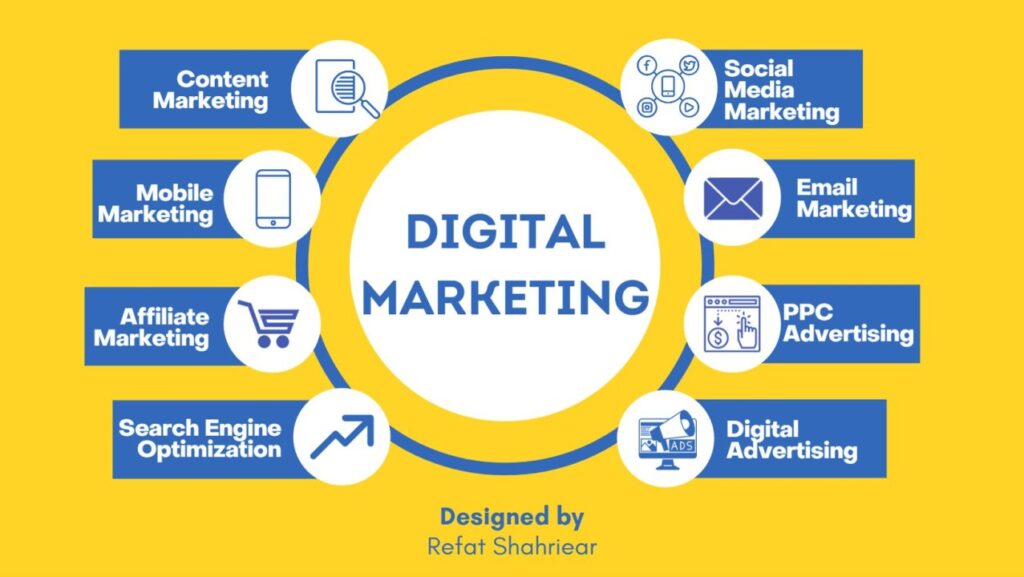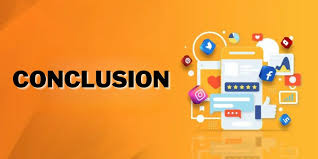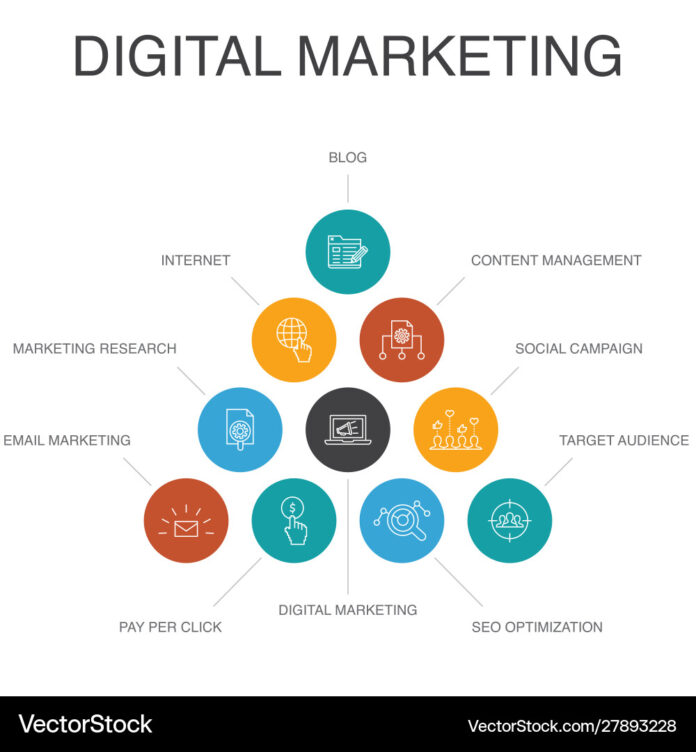In today’s world, businesses and individuals rely heavily on the internet and digital technologies to connect with their target audience. The rise of social media, mobile devices, and the omnipresence of the internet have revolutionized how businesses approach marketing. Traditional methods of marketing are no longer enough in a world dominated by digital channels. This is where digital marketing comes in. But what exactly is digital marketing? Why is it so important for businesses to adopt this strategy? And how can beginners navigate this broad and often overwhelming field?
In this comprehensive guide, we’ll answer these questions and provide you with the fundamental knowledge needed to understand and succeed in digital marketing. Whether you are a small business owner, an aspiring marketer, or someone looking to explore a career in marketing, this guide will help you grasp the core concepts and strategies involved in digital marketing.
1. Understanding Digital Marketing
Digital marketing refers to any form of marketing that involves the use of electronic devices or the internet. It encompasses a wide range of strategies and tactics that businesses use to promote their products, services, or brand online. Unlike traditional marketing methods, such as print ads, radio, or television, digital marketing utilizes digital channels like websites, social media, email, search engines, and mobile apps.
The primary goal of digital marketing is to reach and engage with potential customers through online platforms. This is achieved through various techniques that range from creating a compelling website to managing social media profiles, running paid ads, and optimizing content for search engines. Digital marketing strategies are data-driven, allowing businesses to track their efforts, measure their performance, and make adjustments in real time.
2. The Importance of Digital Marketing
The importance of digital marketing cannot be overstated. As the internet continues to dominate nearly every aspect of life, the way people shop, communicate, and consume information has evolved. Here’s why digital marketing is so crucial:
- Reach and Visibility: The internet has made it possible to reach a global audience. It is allows businesses to reach customers anywhere in the world at any time. With billions of users on platforms like Google, Facebook, and Instagram, businesses can target specific demographics with precision.
- Cost-Effectiveness: Traditional marketing methods, such as print advertising or TV commercials, can be expensive, especially for small businesses. In contrast, its offers a more affordable and scalable alternative. For example, running a pay-per-click (PPC) ad campaign on Google can cost far less than buying a full-page ad in a magazine.
- Measurable Results: One of the most significant advantages of digital marketing is the ability to track and measure results. Tools like Google Analytics allow businesses to monitor website traffic, user engagement, and conversions. This helps marketers determine what’s working and what needs improvement.
- Targeting and Personalization: Digital marketing enables businesses to target their audience more accurately. By using data and analytics, marketers can create personalized campaigns that resonate with specific groups of people based on their interests, behaviors, location, and demographics.
- 24/7 Availability: Unlike traditional marketing channels, digital marketing is always on. A website or social media profile can operate 24/7, allowing businesses to engage with their audience at any time of the day or night.
- Enhanced Customer Engagement: Through digital marketing, businesses can engage with their customers directly. Whether through social media comments, email newsletters, or chatbots, businesses can interact with customers and create meaningful relationships.
3. Core Elements of Digital Marketing
Digital marketing is an umbrella term that encompasses various strategies and tactics. Below, we will break down the most important components of digital marketing that beginners need to understand.

a. Search Engine Optimization (SEO)
SEO is the process of optimizing your website and content to rank higher in search engine results pages (SERPs) for specific keywords. When someone searches for a product or service related to your business, the goal is to have your website appear at the top of the results. SEO involves on-page techniques (e.g., optimizing page titles, meta descriptions, and content) and off-page techniques (e.g., building backlinks from other reputable websites).
b. Content Marketing
Content marketing is the creation and distribution of valuable, relevant, and consistent content to attract and retain a target audience. Content can take many forms, including blog posts, videos, infographics, eBooks, and podcasts. The goal of content marketing is to provide useful information that educates or entertains your audience, ultimately driving them toward a desired action, such as making a purchase or signing up for a newsletter.
c. Social Media Marketing
Social media marketing involves using platforms like Facebook, Instagram, Twitter, LinkedIn, and TikTok to promote your business, engage with your audience, and build brand awareness. Social media marketing includes organic (unpaid) activities, such as posting and engaging with followers, as well as paid advertising, like sponsored posts and ads. A solid social media strategy helps businesses connect with their audience on a more personal level and can drive traffic to websites.
d. Email Marketing
Email marketing involves sending targeted emails to a list of subscribers to promote products, services, or content. It is one of the most effective ways to nurture leads, build relationships, and drive conversions. Whether it’s through newsletters, promotional offers, or transactional emails, email marketing allows businesses to communicate directly with their audience in a personalized way.
e. Pay-Per-Click (PPC) Advertising
PPC advertising is a form of digital marketing where businesses pay a fee each time their ad is clicked. This form of advertising is most commonly associated with search engines, such as Google Ads, but it also extends to platforms like Facebook and Instagram. With PPC, businesses bid on specific keywords, and their ads appear when users search for those keywords.
f. Affiliate Marketing
Affiliate marketing is a performance-based marketing strategy where businesses partner with third-party affiliates (individuals or companies) to promote their products or services. Affiliates earn a commission for every sale or lead generated through their marketing efforts. This is a win-win situation for both parties, as businesses expand their reach while affiliates earn revenue.
g. Influencer Marketing
Influencer marketing involves partnering with influential individuals (influencers) on platforms like Instagram, YouTube, or TikTok to promote a brand. Influencers have large followings and can help businesses gain exposure to a new or wider audience. Businesses typically collaborate with influencers who align with their brand values and target audience.
h. Online Public Relations (PR)
Online PR is the practice of managing a brand’s reputation and building relationships with the online community. It involves engaging with media outlets, bloggers, influencers, and customers. Positive reviews, press mentions, and social media interactions are key components of an effective online PR strategy.
4. Key Metrics to Track in Digital Marketing
To measure the success of your digital marketing efforts, it is essential to monitor specific metrics. These key performance indicators (KPIs) help you determine whether your campaigns are achieving their goals. Common digital marketing metrics include:
- Website Traffic: The number of visitors to your website. This includes both organic and paid traffic.
- Conversion Rate: The percentage of website visitors who take a desired action, such as making a purchase or filling out a contact form.
- Click-Through Rate (CTR): The percentage of people who click on an ad or link compared to the total number of people who saw the ad.
- Cost Per Acquisition (CPA): The cost of acquiring a new customer through a paid marketing campaign.
- Bounce Rate: The percentage of visitors who leave your website after viewing only one page.
- Return on Investment (ROI): A measure of the profitability of your digital marketing efforts, calculated by comparing the revenue generated to the cost of your campaigns.
5. Getting Started with Digital Marketing
As a beginner in digital marketing, it can feel overwhelming with so many strategies and platforms to consider. However, starting with the basics can help you build a solid foundation. Here are some steps to get you started:
- Identify Your Goals: What do you want to achieve with digital marketing? Whether it’s increasing brand awareness, generating leads, or driving sales, having clear objectives will help guide your strategy.
- Know Your Audience: Understanding your target audience is key. Research their demographics, interests, pain points, and where they spend their time online.
- Build a Strong Online Presence: Ensure that your website is user-friendly, mobile-optimized, and SEO-friendly. Set up profiles on social media platforms that are relevant to your audience.
- Create Engaging Content: Invest time in creating high-quality content that resonates with your audience. Whether it’s blog posts, videos, or infographics, your content should be informative, engaging, and aligned with your brand.
- Experiment and Analyze: Digital marketing is a dynamic field. Don’t be afraid to experiment with different strategies and tactics. Use analytics tools to track your performance and adjust your approach as needed.

6. Conclusion
Digital marketing is an essential tool for businesses of all sizes. It offers the ability to reach a global audience, track performance in real-time, and create personalized experiences for customers. As a beginner, it may seem complex at first, but by understanding the key components and starting with a solid strategy, you can master the basics and gradually expand your digital marketing efforts.
Whether you’re looking to enhance your business, start a career in digital marketing, or simply expand your knowledge, this guide provides a comprehensive overview to get you started. Embrace the digital age and start leveraging the power of digital marketing today!
In today’s world, businesses and individuals rely heavily on the internet and digital technologies to connect with their target audience. The rise of social media, mobile devices, and the omnipresence of the internet have revolutionized how businesses approach marketing. Traditional methods of marketing are no longer enough in a world dominated by digital channels. This is where digital marketing comes in. But what exactly is digital marketing? Why is it so important for businesses to adopt this strategy? And how can beginners navigate this broad and often overwhelming field?
In this comprehensive guide, we’ll answer these questions and provide you with the fundamental knowledge needed to understand and succeed in digital marketing. Whether you are a small business owner, an aspiring marketer, or someone looking to explore a career in marketing, this guide will help you grasp the core concepts and strategies involved in digital marketing.
The importance of digital marketing cannot be overstated. As the internet continues to dominate nearly every aspect of life, the way people shop, communicate, and consume information has evolved. Here’s why digital marketing is so crucial:

